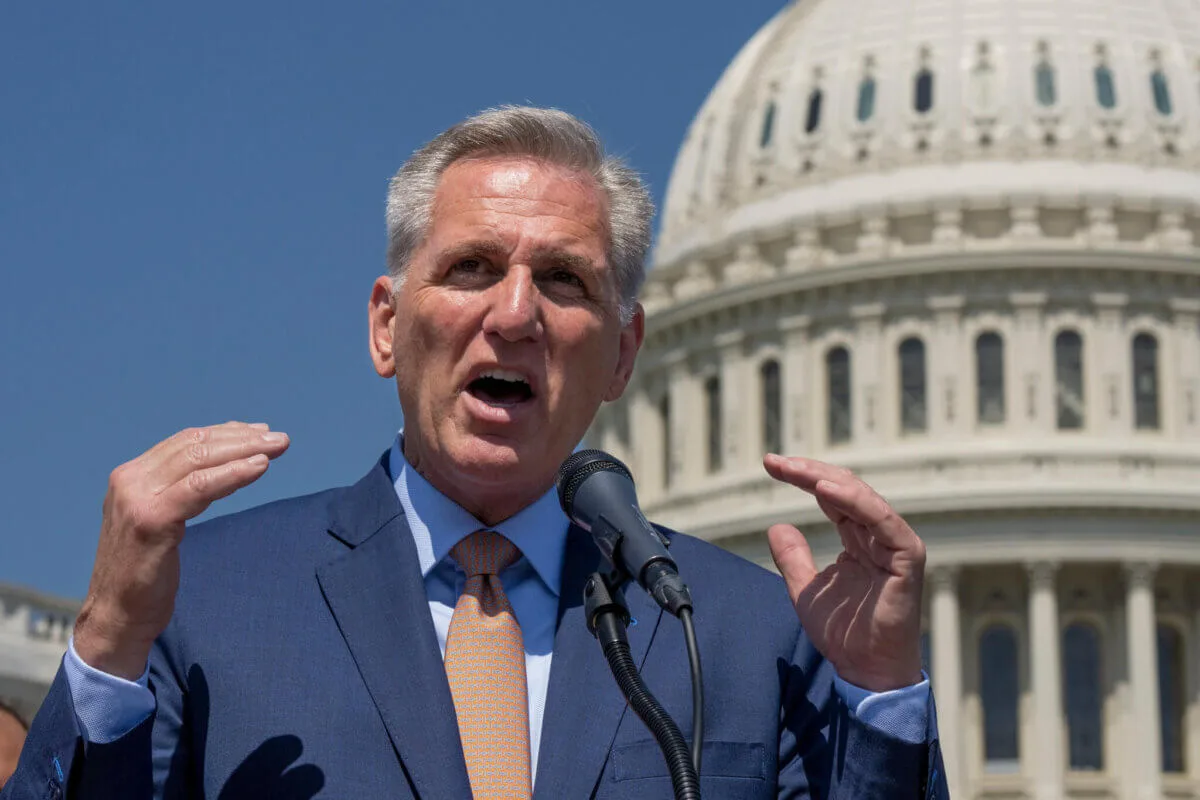
FILE - Speaker of the House Kevin McCarthy, R-Calif., speaks at the Capitol in Washington, Thursday, April 20, 2023. The Democratic president and Republican congressional leader have each tried to assure the public in recent weeks that they don't want the government of the world's largest economy to default. But President Joe Biden has resisted McCarthy's calls for negotiations, while McCarthy is pushing a plan that can't pass the Democratic-majority Senate. (AP Photo/J. Scott Applewhite, File)
If the country defaults on its debt, millions of people would lose their jobs, retirement accounts would be decimated, Social Security payments could be delayed, Medicare and Medicaid benefits could be affected, and military members could see paychecks delayed.
As early as June 1, the United States could default on its debt for the first time ever, sending the economy into complete free fall, causing millions of hard-working Americans to lose their jobs and decimating retirement accounts.
This outcome, which becomes more likely with each passing day, has been made possible by the actions of the Republican-controlled House of Representatives, which has refused to increase the nation’s debt ceiling, an arbitrary numerical limit set by Congress on how much money the federal government can borrow to pay its bills.
Republicans have said they will let the U.S. default unless President Joe Biden and Senate Democrats agree to make huge spending cuts that could devastate programs like Medicaid health insurance, the Supplemental Nutrition Assistance Program (SNAP) for food aid, child care assistance, veterans benefits, and countless other programs that tens of millions of Americans rely on.
In other words, Republicans are forcing Democrats to choose between a likely economic collapse or gutting benefits that middle class, working class, and poor Americans rely on.
Wait, why do we even have a debt ceiling? And why do we need to borrow money to pay our bills?
Due to decades of tax cuts for corporations and the wealthy and simultaneous increases in spending—especially under Republican administrations—the federal government spends more than it takes in in taxes most years. This means that the government has to sell Treasury securities, like U.S. government bonds, to borrow money to cover the difference and pay the country’s bills, up to the limit set by Congress. This limit is what’s known as the debt ceiling.
When the government reaches that borrowing limit, Congress can either raise the debt ceiling or vote to suspend it for a specific period of time, allowing the Treasury Department to sell more securities and borrow as much as it needs to pay what America owes. Congress has raised the debt ceiling 78 times since 1960, because failing to raise the limit would cause the U.S. to default on its debt, triggering a global financial crisis.
What happens if we default on our debt?
We don’t know for certain, because the United States has never defaulted on its obligations, but doing so would likely cause a recession, with things getting worse the longer a default lasts.
Here’s what we do know: The Treasury Department would have to immediately decide how to use what funds it does have, effectively deciding which payments to prioritize. Some experts believe the department might have to legally prioritize paying those who’ve purchased Treasury securities. If this happens, tens of millions of Americans could see government payments or benefits delayed, including the 66 million people who receive Social Security benefits.
The roughly 41 million people who rely on SNAP to be able to afford groceries, and the more than 100 million people who rely on Medicaid and Medicare for health care could also see their benefits affected. Millions of federal employees and active-duty military members could also see paychecks delayed, and disability payments and pensions for some veterans could be impacted.
To put it simply: The government would either default on its debts to bond holders or on payments and services it owes to Americans, and the ripple effects would be catastrophic.
A default would cause interest rates to rise, which would make it more expensive for businesses and individuals to borrow money. Higher rates would also add to their existing debt, making it more difficult to pay off. Even if Congress acted to raise the debt ceiling within a few weeks of default, the damage would be comparable to that experienced during the 2008 financial collapse, according to a January report from Moody’s Analytics, an economic research firm.
A default that lasts roughly six weeks, meanwhile, would cause more than seven million job losses, push the unemployment rate above 8%, cause a 4% decline in real GDP through the end of 2024, and lead to a stock market collapse that wipes out $10 trillion in household wealth, Moody’s found.
Analysis from other economic experts have found similarly devastating impacts resulting in a recession and millions of job losses if a prolonged breach were to occur.
The damage wouldn’t be contained to our borders, either. Because America plays such a critical role in the global economy, with trillions of dollars of international assets tied to the value of U.S. bonds, a default in America could cause a global financial crisis. A default could also harm the nation’s long-term standing in the global economy; the U.S. could see its credit rating downgraded, harming the economy for future generations.
Why won’t Republicans raise the debt ceiling?
Because they want Democrats to make huge cuts to federal spending in exchange for increasing the debt ceiling.
Democrats raised the debt ceiling with no preconditions three times under the Trump administration, but Republicans are now effectively holding the debt ceiling—and the economy—hostage unless Democrats agree to make huge cuts to critical programs.
Democrats have refused to entertain such cuts, but Republicans have given no signs they’ll budge, arguing that such cuts are necessary to reduce the national deficit.
Are there other ways to reduce the deficit?
Yes, namely raising taxes on corporations and the super rich, which have been cut time after time over the past 40-plus years.
In 1980, the top corporate tax rate for companies earning over $100,000 a year was 46%. Today all corporations pay only a 21% tax. In 1980, the personal income tax rate for the very richest Americans was 70%. Today it’s 37%.
Biden’s budget proposal, introduced in March, sought to increase the corporate tax rate from 21% to 28%—still well below the 35% rate that existed until Republicans passed a huge corporate tax cut under the Trump administration in 2017. Biden’s plan would also raise taxes on Americans earning over $400,000 per year.
The president has also called on Congress to pass a billionaire tax, which would ensure the nation’s wealthiest Americans—who often exploit loopholes in the system to avoid paying their fair share—pay a minimum tax rate of 25%.
Republicans have refused to entertain Biden’s proposals and are instead focused on extending the Trump-era tax cuts for wealthy taxpayers.
So what happens next?
President Biden and House Speaker Kevin McCarthy (R-California) are set to meet on Tuesday to discuss the debt ceiling. But neither side has given any indication that they’ll back down.
Biden continues to call for a so-called “clean” increase of the debt ceiling, without attached preconditions, while McCarthy and his fellow Republicans are demanding huge cuts to spending.
Over the weekend, the Republicans only hardened their stance, as a group of 43 Senate Republicans, including Senate Minority Leader Mitch McConnell (R-Kentucky), signed onto a letter from Sen. Mike Lee (R-Utah) saying they will not support a debt ceiling increase without “substantive spending and budget reforms.”
Biden has made clear he is happy to negotiate future budgets and spending, but not in relation to the debt ceiling—a position the American public seems to agree with.
A Washington Post-ABC News poll found that 58% of Americans say the debt limit and federal spending should be handled as separate issues, while 26% say Congress should only raise the debt ceiling if Biden agrees to cut spending.
House Minority Leader Hakeem Jeffries (D-New York), Senate Majority Leader Chuck Schumer (D-New York), and Senate Minority Leader Mitch McConnell (R-Kentucky) will also attend Tuesday’s meeting.
It’s possible that the two sides could agree to a short-term increase of the debt ceiling while they hammer out some sort of deal on longer-term spending, but neither side has given an indication that such a deal is likely.
Anticipating that Republicans won’t budge after Tuesday’s meeting, House Democrats are separately trying to use a special House rule to bypass McCarthy and raise the debt ceiling, but this long-shot effort would require at least five Republican representatives to agree to buck their own party and pass a clean increase of the debt ceiling without spending cuts.
The White House is also considering another option, though it’s an even longer shot: invoking the 14th Amendment of the Constitution to declare the limit unconstitutional, which would allow the country to keep borrowing to pay bills, even if Congress doesn’t act. The amendment, which was passed after the Civil War and granted citizenship to former slaves, also includes a section on public debt, which says “the validity of the public debt, authorized by law … shall not be questioned.”
Some legal experts believe this phrase means the White House can ignore Congress and simply allow the Treasury to continue borrowing money. As the Washington Post reported, under this rationale, the Biden administration would argue that Congress approved two laws that contradict each other: the first being the debt ceiling itself, and the second being legislation that ensured the country would surpass the limit set by the debt ceiling.
Such a move would almost certainly lead to lawsuits and could have other unintended consequences, and Biden himself has seemed weary of the idea, though has not dismissed it outright.
“I’ve not gotten there yet,” Biden said about the 14th Amendment when asked by MSNBC on Friday.
Ultimately, something will need to give, or else the next few weeks and months could get ugly.
Politics

Emergency rooms refused to treat pregnant women, leaving one to miscarry in a lobby restroom
By AMANDA SEITZ Associated Press WASHINGTON (AP) — One woman miscarried in the lobby restroom of a Texas emergency room as front desk staff refused...



Video: These are Florida’s best theme parks, according to top US 2024 guide
Local News



Emergency rooms refused to treat pregnant women, leaving one to miscarry in a lobby restroom
By AMANDA SEITZ Associated Press WASHINGTON (AP) — One woman miscarried in the lobby restroom of a Texas emergency room as front desk staff refused...







